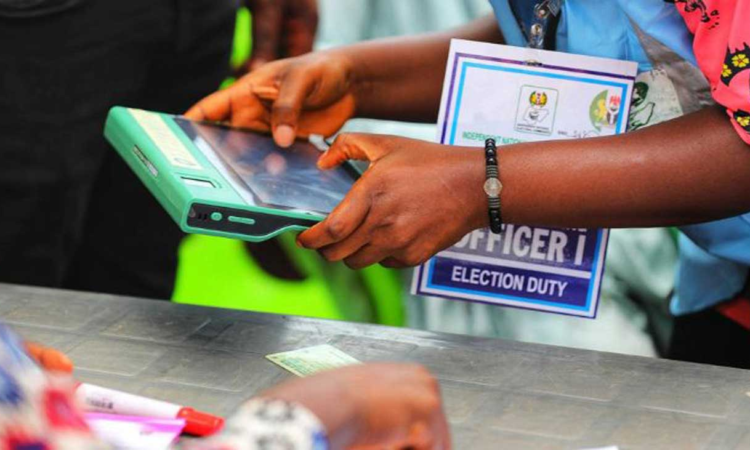
BVAS
A major development in the just concluded 2023 elections was the incorporation of new voter accreditation system that utilises digital technology tools such as the Bimodal Voter Accreditation System (BVAS) to prevent manual manipulation of figures. CHIJIOKE IREMEKA writes on the improvement of BVAS and other technologies brought to the country’s electoral processes and their potential to shape the future of Nigeria’s democracy.
Recently, The Guardian published a story in December 5, 2022, under the headline: Overcoming challenges and plots ahead of 2023 elections. In the story, allegation of a conspiracy to scuttle the anticipated free, fair and credible polls in the country was raised.
The machination provoked a number of stakeholders across Nigeria to warn that the country might be set on the path of political crisis that may lead to the electoral debacle that led to the death of the First Republic.
The article pointed at the widespread trepidation and conspiracy across the country over alleged plots to compromise the credibility of the elections. The conspiracy skidded into the top gear as politicians, who felt that the deployment of the Bimodal Voter Accreditation System (BVAS) with its dual fingerprint and facial biometric accreditation process would not allow them to perfect their enterprise, sought suspension of the technology and removal of the Independent National Electoral Commission (INEC) Chairman, Prof. Mahmood Yakubu.
Against this backdrop, President Muhammadu Buhari and Yakubu at several and different occasions said no going back to the days of election malpractices and made a number of promises to Nigerians and international community on the country’s commitment to free, fair and credible elections.
The insistence by the Federal Government and INEC on conducting credible elections led to the deployment of technologies that would make manipulation impossible, including BVAS that has been described as a vaccine against vote rigging.
BVAS became the only means of voter’s accreditation approved by the newly signed Electoral Act haven shown the capacity to curb or reduce election malpractices to the barest minimum.
Already, the technology had been tested in Anambra, Ekiti and Osun states, where they were first deployed before its full-scale deployment during the 2023 general elections. The deployment of BVAS was done despite reports that INEC was under serious pressure to compromise its position on free, fair and credible elections.
Those who witnessed the performance of the technology, especially in the previous election in Isoko South Constituency 1 bye-election in Delta State on September 10, 2021, where it was first deployed before Anambra, Ekiti and Osun states, rated it high.
In line with INEC’s resolve to conduct credible elections, the commission said it had taken steps to strengthen its digital assets with a view to ensuring security of all its web-based resources and technologies when there were failed attempts by fraudsters to hack into the INEC Results Viewing (iRev) Portal to change the polling units-level results in the previous elections in Ekiti and Osun states.
“For this reason, the commission has introduced many new innovations, supported by the deployment of appropriate technology to protect the sanctity of the choice made by Nigerians at the polls, ranging from voter registration to voter accreditation and result management,” the INEC boss hinted at a forum.
According to Yakubu, BVAS has come to stay and would be the only means by which voters would be accredited in the 2023 general election.
Also, the introduction of the INEC IReV Portal has made the result management procedure more transparent. Polling Unit results are now uploaded in real-time to the IReV portal for public view.
The Guardian learnt that the Permanent Voter’s Card (PVC) and the Smart Card Reader (SCR) were introduced to the country’s voting process under former Chairman of INEC, Prof. Attahiru Jega, which significantly improved the process.
It was learnt that the SCR did not only work remarkably well, it was enthusiastically welcomed by a majority of the rural folks to the chagrin of the naysayers. The immediate upshot was that those opposed to its deployment were silenced by its performance and its acceptance.
To tackle the shenanigans of the politicians and the shortcomings of the SCR, the commission introduced BVAS. Earlier, where the SCR correctly read fingerprints but failed to accredit a voter, such a voter was allowed to fill an Incident Form to make him or her eligible to vote. But soon, the politicians took advantage of this loophole to perpetrate identity fraud and make voters, in many cases, to vote more than once.
BVAS, as stipulated in the Electoral Act 2022, is a technological system that allows for accreditation of voters through biometrics, capturing and uploading of results, among others. It has been described by many as an upgrade of the smartcard reader used in the last general elections, which achieved some results in the country’s electoral process.
Among the technologies introduced by the electoral commission that improved the credibility and outcome of the 2023 general elections, though there were alleged cases of violence, voters intimidation and voters suppression,
is the IReV in 2020. This was brought in during the Edo State governorship election. It is an online platform designed to promote transparency in the electoral process; it allows for easy dissemination of polling unit results, making the electoral process more transparent and accountable to citizens.
The portal also provides accessibility for the general public to view official election results in real-time. The IReV provides an easy way for citizens to verify the results, and it increases the credibility and prevents electoral fraud.
Also, there was the Election Result Analysis Dashboard (ERAD), a tool developed by a civil society organisation, Yiaga Africa. The ERAD allows for real-time aggregation and analysis of polling unit results uploaded to the IReV. This helps to increase transparency and credibility in the election process, as well as eliminate the need for citizens to wait for results to be announced on traditional media. It provides them with the results as soon as they are available.
The dashboard can also help to identify and address any potential issue or discrepancy in the results, which can help to increase the overall integrity of the election and detect electoral malpractices.
Thus, the deployment of technologies in the 2023 elections brought about a number of improvements, though some schools of thoughts felt that the technologies, especially BVAS, failed the country despite its achievements.
It is on record that for the first time, some sitting governors in the country lost elections in the manner that they did. The improvement associated with the deployment of the technologies, especially BVAS, was seen in Lagos where, for the first time since 1999, Asiwaju Bola Tinubu lost an election to a party considered to be small. By the same reason, a number of sitting governors failed in their attempts to become Senators in the 10th National Assembly.
The first governor that comes to mind is Ben Ayade of Cross River State who lost to Sen. Jarigbe Agom-Jarigbe, the sitting Senator in Cross River North district.
Titus Zam of the APC, a former aide to Benue State Governor Samuel Ortom, defeated Ortom in the race for the Benue North-West Senatorial seat. Senator Adamu Aliero of the Peoples Democratic Party (PDP) was declared winner of the Kebbi Central Senatorial District election. Aliero defeated Governor Abubakar Bagudu, according to the INEC Returning Officer, Prof. Abbas Yusuf-Bazata, who announced the results in Birnin Kebbi.
Governor Ifeanyi Ugwuanyi of Enugu State was defeated in his race for the Senate by Okechukwu Ezea of the Labour Party (LP) as Governor Darius Ishaku of Taraba State, the outgoing two-term PDP governor, lost to David Jimkuta. Governor of Plateau State and Director General of the APC Presidential Campaign Council, Simon Lalong failed to win the ticket to the green chamber. The former Chairman, Northern Governors’ Forum and a political heavyweight lost to PDP’s Bali Napoleon at the Plateau South Senatorial District election. In the same manner, Senator Enyinnaya Abaribe of All Progressives Grand Alliance (APGA) defeated the sitting Governor Okezie Ikpeazu at the Abia South Senatorial election.
Observers believe that these heavyweight politicians would have done everything possible to win the elections if INEC had not introduced BVAS and declared it to be the only legal means of accrediting voter for election.
A chieftain of the APC and Director-General of the Voice of Nigeria (VON), Mr. Osita Okechukwu, in an interview with The Guardian, commended INEC’s performance in the successful conduct of the governorship election in Anambra State, describing the technology as a vaccine against vote rigging.
“My submission is that BVAS and the earlier smart card readers are vaccines against vote rigging. Methinks that in no distance future, our electoral system will be one of the most credible, free and fair. Naturally, the credit goes to INEC. Yes, there were hitches as it is always the case in the early usage of any type of technology, there is no doubt that the card reader and its brother, BVAS, will be our saviour. The flip-flop witnessed earlier will be our best teacher in future elections,” he enthused.
Okechukwu said his father’s technology story reinforced his faith in how technology could change the generational attitude of cynic people like Nigerians. “Technology, no doubt, would reinforce the social contract between the elected president, governors, legislators and the electorate.”
To Okechukwu, technology has commenced the transformation of the psyche of politicians to be more loyal to the electorate than godfathers. “It is a revolution, for if it is federal might, APC could have won Anambra squarely. This was the folly of those who continue to hope to rig elections at collation centres.”
Globally, the deployment of technology in the electoral process has become prevalent in the recent times as the world seeks to achieve free, fair and credible election.
The 2023 general elections were largely driven by technology and it was a watershed for the country as it navigated a complex political landscape starting with awareness to mobilisation, voting and collation.
According to the Information Technology Officer, Yiaga Africa, Samuel Folorunsho, the Internet and social media have drastically changed how elections are run. Candidates now rely heavily on television and print ads to reach voters.
“But today’s candidates must also have a strong online presence to succeed. Candidates now use social media to connect with voters and get their message out. They can reach a larger audience with less money, which levels the playing field somewhat.”
The Guardian learnt that this social media campaign did wonders for the Labour Party (LP) Presidential candidate, Peter Obi. He started with few people and later made a serious inroad going by how the youths and LP supporters mobilised across the country for him. However, not all candidates are equally adept at using technology.
“Those who are more tech-savvy often have an advantage over their opponents. Technology has also changed how information about candidates is disseminated. In the past, people got their information about candidates from the news or from campaign ads. Today, electorate can get information about candidates from a variety of sources, including social media, news blogs, and websites. This abundance of information can be both good and bad for candidates.
“On one hand, it gives voters more opportunities to learn about the candidates and on the other hand, it can be overwhelming and make it difficult for voters to sort through all the information and make an informed decision. Technology has made it easier for people to vote.
“Additionally, there are now various ways to register to vote, making it possible for many more people to participate. In recent years, we have seen election results driven by a variety of technologies, from social media to big data analytics. As we move into the future, it is clear that technology will continue to play a major role in elections.”
Speaking on how technology has helped, Mr. Obasi Chikelu said: “This is perhaps one of the notable ways that technology is being used in Nigerian elections -the use of phone or digital cameras. From North to South, voters were seen taking advantage of their smartphone cameras to capture the situation across various polling units.

A voter’s indentity is confirmed by fingerprint on a Bimodal Voter Accreditation System (BVAS) at a polling station in Ibadan on February 25, 2023, during Nigeria’s presidential and general election. (Photo by Samuel Alabi / AFP)
“By sharing photos and videos on social media platforms such as Twitter and Facebook, voters seem to be holding politicians and election officials accountable, providing transparency and helping to deter malpractices. This contributed to cancellation and extension of voting to Sunday after reports of violence and voters suppression were uploaded online by the electorate.
A voter’s indentity is confirmed by fingerprint on a Bimodal Voter Accreditation System (BVAS) at a polling station in Ibadan on February 25, 2023, during Nigeria’s presidential and general election. (Photo by Samuel Alabi / AFP)
“Another way technology played a major role is in its potential to make real-time reporting possible through the Internet. The electorate and journalists took the advantage of it to report news in real-time, connecting their newsrooms across the country or serving their foreign editors and publishers from various polling units.
“This year, the widespread internet access across the country aided reporters, bloggers and other masses in their role of sharing updates on social media and their websites. When thugs disrupted some polling units, reporters were swift to turn in reports to alert the world.”
Zeenat Sambo said: “Technology has reshaped the world and is increasingly motivating creative minds to explore different ways of improving social services. Health, agriculture, power and other critical industries have witnessed great improvement through the impact of technology, which is rapidly transforming all facets of human existence into a digital world.
“Considering the monumental impact of technology across several sectors of Nigeria’s economy, citizens are clamouring for the adoption of digital technology to further advance the nation’s democratic governance by using e-voting platforms.
“Specifically, Nigerians are eagerly looking forward to speedy innovation of the electoral management system for greater efficiency, transparency, and elimination of fraud inherent in the extant manual system. Nigeria’s democratic journey from 1999 is going through twists and turns due to the chaotic reaction that follows the outcome of every election by both winners and losers.
“With an estimated population of about 200 million people spread across 774 local government areas, the country must digitalise the electoral process. The registration of voters, casting of ballot, collation and counting of the ballot, and transfer and release of results can be driven by technology to achieve free, transparent, and credible elections. By doing so, the country would be leveraging technologies proudly developed by Nigerians for effective management of our electoral process, thereby entrenching a robust and stable democratic ethos.
“In the determination to implement its mandate, the National Information Technology Development Agency (NITDA) has prioritised and promoted the use of technology by the INEC throughout the entire electoral process to guarantee well-organised and acceptable elections across the country.
“Thus, it is important to fully focus on the deployment of innovative technologies in the electoral process. Our ability to develop innovative applications to solve many other problems can be extended to improve our electoral system through the power of digital technologies.
The use of electronic voting will speed up vote counting, cut the cost of paying staff to count votes manually, provide easier access to disabled persons to vote, and funding for elections will decrease.
“E-voting is an electoral process that uses electronic means to enable the casting of ballots, counting of ballots, and transmission of the election result from polling centres to the central office of the electoral management body. It involves the use of electronic voting machines (EVMs) placed in polling stations to ensure a credible non-interference voting system.”
It was learnt that it was in the light of the above that the launch of Wardchat, a social network platform created to digitalise the Nigerian electoral community, is quite remarkable. This shows the unrelenting effort of Nigeria’s tech startups to bring improvement to the nation’s electoral process.
Wardchat is a social network digital application built by an indigenous startup company, Wardchat Nigeria that connects voters across wards, districts, and states within the country. The social network can support the electoral structures in 36 states and the FCT, 774 local government councils, 8802 wards, and over 176,000 polling units.
However, the INEC has not admitted it openly, there are strong indications that the BVAS and the iRev failed the required stress tests, hence there is room for improvement. The inability to manage or implement the Data In Motion (DIM) may have accounted for the many queries on the technology.
You must be logged in to post a comment.
Why are you flagging this comment?
I disagree with this user
Targeted harassment – posted harassing comments or discussions targeting me, or encouraged others to do so
Spam – posted spam comments or discussions
Inappropriate profile – profile contains inappropriate images or text
Threatening content – posted directly threatening content
Private information – posted someone else’s personally identifiable information
Before flagging, please keep in mind that Disqus does not moderate communities. Your username will be shown to the moderator, so you should only flag this comment for one of the reasons listed above.
We will review and take appropriate action.
Get the latest news delivered straight to your inbox every day of the week. Stay informed with the Guardian’s leading coverage of Nigerian and world news, business, technology and sports.
Follow Us







